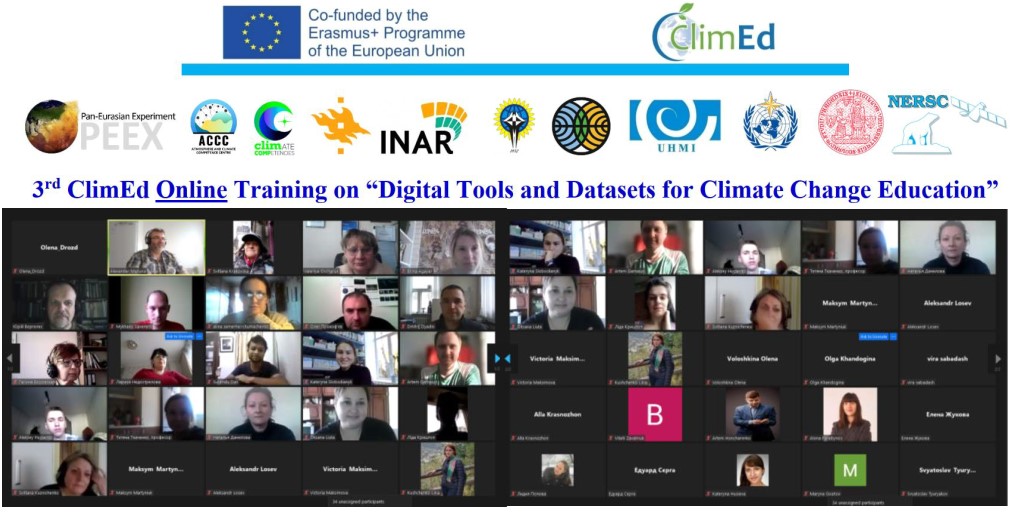Project Description

The ClimEd 3rd Online Training on “Digital Tools and Datasets for Climate Change Education” took place online during 26 October – 12 November 2021. The ClimEd project trainings are focused on training the faculty/ teaching/ research staff and postgraduates at the ClimEd partner institutions and collaborating organizations in advanced educational and information-and-communication technologies for building a flexible multi-level integrated practice-based education system in the field of Climate Services, Climate Change Adaptation and Mitigation.
In total, 45 persons (including 30 female and 15 male; and 15 young teachers/researchers) were accepted to participate in this online training. These were from the Ukrainian ClimEd partners and other institutions such as the Odessa State Environmental University, Kyiv National University of Construction and Architecture, O. Beketov National University of Urban Economy, Lviv Polytechnic National University, Bila Tserkva National Agrarian University, Odessa National Medical University, Kherson State Agrarian and Economic University, Ukrainian Hydrometeorological Institute, EGIS Ukraina, Institute Northern Environmental Problems, Polar Geophysical Institute, and Visva-Bharati University.
The training included a series of lectures delivered during 26-28 October 2021. The presented lectures covered the following topics/ themes: IPCC Assessment Report with its regional focus/context on Ukraine; current status and perspectives; current status and perspectives of activities in support climate related research and WMO integrated climate services; observations for climatic variables: obs. system, specifics, challenges; remote sensing/satellite observations: current state, perspectives, databases, and applicability of results; global and regional scales climate modelling: current state, perspectives, databases, and applicability of results; urban scale modelling for climate applications; climate related datasets, Copernicus related data, tools for visualization and analysis of climate related data; and finally, the Introductions to Home-Work-Assignments (HWAs).
The lectures were delivered by Drs. Svitlana Krakovska (from the Ukrainian Hydrometeorological Institute, Ukraine); Wilfran Moufouma Okia (World Meteorological Organization, Switzerland); Antti Mäkelä, Larisa Sogacheva, Putian Zhou (Finnish Meteorological Institute, Finland); Alexander Mahura (University of Helsinki, Finland) and Profs. Tomas Halenka (University Charles in Prague, Czech Republic), Igor Esau (Nansen Environmental Remote Sensing Center, Norway).
During followed weeks the Groups of participants realised remotely HWAs as the Groups’ small-scale research projects. Each mixed group included 3-4 persons – from different Universities, gender, age. In total, 12 Groups (C1-C12) focused on the themes of the water management, climate change, agriculture and energy sectors, urban economy, others. The Groups established horizontal communication within/between groups and worked on own related HWAs. Such work includes also virtual zoom-consultings by teachers (Svitlana Krakovska, Putian Zhou, Larisa Sogacheva, Inna Khomenko, Alexander Mahura) once per week and it was done actively using the Moodle system of OSENU.
On 12 November 2021, during the last day of the training, each Group presented own completed projects: C1 “Water Management – Vistula river basin”; C2 “Climate change and its impact on beekeeping and sheep breeding in Ukraine”; C3 “Efficiency of green roofs in urban areas for stormwater retention under climate change”; C4 “Climatic prospects of the green energy transition in the city of Zhytomyr”; C5 “Water Management – Assessing the impact of climate change on water resources of Kherson, Odessa, and Kyiv regions on basis of models climate-runoff”; C6 “Dynamics of the meteorological regime and climate of the Antarctic Peninsula”; C7 “Renewable sources energy potential of Odessa region”; C8 “The impact of climate change on the development of agriculture in the Lviv region of Ukraine”; C9 “Assessment the influence of meteorological conditions for safe operation of nuclear power plants in various climatic zones”; C10 “Agriculture (livestock product technology)”; C11 “Water management – Danube basin of Ukraine”; and C12-“Urban economy – energy consumption”. All presentations were constructively criticized and commented as well as overall evaluated on a scale (1-10). As the result of the evaluation, the ClimEd training certificates (corresponding to 3 ECTS) were awarded as recognition of participants’ achieved learning outcomes.
Four groups (C03, C04, C09 and C12) got the highest scores of 9.26, 9.29, 9.29, and 9.46, respectively, and these have been awarded the certificates with distinction (“Platinum”). Three other Groups (C02, C06, and C11) obtained certificates having the “Gold” status (i.e. with scores higher than 8.5). Note that members of these 7 Groups were automatically accepted (i.e. without required application procedure) as approved participants for the ClimEd 4th Training (expecting in February 2022 as a face-to-face/onsite training in Spain).
It was stressed that participants of the training have obtained new/ upgraded basic knowledge about IPCC Assessment Report, current activities in support climate related research in Ukraine; WMO mechanisms and entities for provision of operational seasonal forecasts, current limitations of WMO regional climate outlook forums and reasons to expand portfolio of climate products, key features of objective seasonal forecasts; existing types, specifications and challenges of meteorological/climate observation systems; main principles, instruments, satellite Earth Observations products; Earth System Modelling, basic information of CMIP6 and its datasets; needs, use and advantages of regional climate models for local/regional impact studies; urban integrated system approach, principle modeling strategies at fine spatial resolution in the atmospheric boundary layer; datasets at Copernicus Climate Change Service (C3S) Climate Data Store (CDS); and better understanding possibilities of C3S CDS Toolbox in climate data visualisation and analysis as well as skills in usage of C3S CDS Toolbox for group projects (as small-scale research projects) and skills in group’s (as the team) developing and realizing research plan, and presenting research project results.
The e-evaluation of the ClimEd 3rd Training was done using two questionnaires distributed among participants. Following the 1st questionnaire – (Evaluation of the Training) – about 90% of the participants estimated overall rating for this course as ”very good” and “good”; training materials were of excellent quality (84%) and information about training was sufficient (97%), and participants will recommend such training to colleagues (91%). Following the 2nd questionnaire – (Self-Evaluation of the Obtained Competencies and Skills) – about 70% of participants “fully agreed” ad “mostly agreed” that they have obtained/ improved their competencies and got skills in usage of the C3S CDS Toolbox remotely/ virtually working as groups.
Especial thanks to all the lecturers and teachers of the training for their professionalism, enthusiasm and commitment to the training. Especial thanks to the OSENU team members – Drs. Oleg Shablii and Inna Khomenko, young researchers Kateryna Husieva and Artem Gamaiun – for continuous technical support (OSENU Moodle system, e-evaluations, training web-page continuous updates with training materials, for support with ClimEd relevant training preparation and HWAs, etc.) during the entire period of the training.
All materials of the training (slides and videos of lectures, presentations of exercises and homework-assignments as group projects, etc.) are available at http://climed.network/events/climed-trainings/climed-training-3-online/
Text by: Valeriay Ovcharuk (OSENU), Tetyana Kryvomaz (KNUCA), and Alexander Mahura (UHEL)
